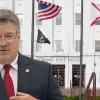|
Getting your Trinity Audio player ready...
|
The Alabama House of Representatives held a public hearing Wednesday where speakers debated the efficacy of a bill that would tax money sent abroad using certain international money transfer services.
House Bill 297, sponsored by state Rep. Jennifer Fidler, R-Silverhill, would add a four percent tax to forms of international money transfers, services that are often available in grocery or convenience stores and utilized by immigrants to support their families abroad.
HB297 was approved by the House Ways and Means Committee in March, before being referred back to the House Financial Services committee.
Fidler said the bill was part of a package of immigration legislation being pushed by Republican lawmakers after several took a trip to the U.S.’s southern border last year.
“This whole idea came out of that trip that some of our colleagues went to the border and they kind of came back and said this is what we should be doing,” Fidler told the committee of HB297.
“We were seeing burdens—community burdens—in our communities that were caused by this influx, whether it be non-English language speaking students in our schools or issues with our law enforcement where they weren’t having enough money to be able to house some of the immigrants,” Fidler said.
Fidler also claimed hospitals were put under increased stress due to “uncompensated care” caused by an influx of undocumented immigrants.
Fidler highlighted the forms of payment HB297 does not affect, including payment processors like PayPal or Venmo or any transaction originating from a banking institution.
“Who it does affect are individuals who send cash wired through companies that generally offer in-person services,” Fidler said, “including cash transfers like Western Union or MoneyGram, or individuals who send cash transfers where [a] licensed legitimate bank is not involved.”
Fidler said HB297 puts 2.5 percent of the total four percent tax back into local communities “in which the burden occurs from the—with the migrant influx,” as well as 1.5 percent to sheriff departments across the state.
HB297 would also create the Immigration Assimilation Resource Fund in the Alabama State Treasury “to fund English language learner instruction and public health.”
The bill would also establish the Sheriff’s Immigration Enforcement and Detainer and Immigration Assimilation Resources Funds “for costs and expenses related to enforcing immigration laws and housing violators of immigration laws.”
According to Fidler the tax would provide the state with “no less than $10,000,000 in revenue.”
Fidler said the top ten recipients of funding from the bill would be Jefferson, Madison, Mobile, Montgomery, Tuscaloosa, Shelby, Baldwin, Lee, Marshall and Dekalb counties.
HB297, if passed would expire in 2029, with Fidler telling the committee that officials would then be able to evaluate its effectiveness and decide whether to enact it again.
HB297 also provides for a tax credit of up to $5,000 to be received at the end of the year for taxpayers who use international wire transfers.
Alabama Sheriffs Association Executive Director Hoss Mack and legal consultant Randy Hillman spoke in favor of HB297.
“Everybody knows that the current administration has stepped up a great deal to address this illegal immigration issue, however, it’s still a local issue,” said Mack.
Mack argued that the counties Fidler listed were most impacted were along Interstates 10, 20 and 59, common routes of travel for undocumented immigrants settling in Alabama.
“A lot of drug flow and a lot of illegal immigrant flow comes through our state through these—they’re classified as drug corridors,” Mack said.
Mack also alleged money sent using wire transfer services has been used to fund drug cartels abroad.
“We know a lot of drugs flow into this country. But how do those drugs get into this country? They get here by money. Money flows back,” Mack said.
“This is an important bill. It gives us another tool in our toolkit, and I pray you give it a favorable report,” Hoss said.
During the hearing, Hillman showed committee members a photo of a Montgomery wire transfer business, which featured telephones for contacting a money service company representative, who asks the customer how much money they want to send before giving them a code to give alongside their cash to give to the store’s cashier to complete the service.
“This is classic, classic money laundering, OK?” Hillman argued. “You pay the clerk that $100 and then the $100 disappears and it reportedly goes to wherever you want to go. We don’t know where it goes and who is the middleman in between? I’ll let you make up your own mind about that.”
Money Service Business Association Executive Director Kathy Tomasofsky spoke against HB297.
Tomasofsky argued the bill was unnecessary due to already existent federal regulations on money service businesses. She said, if implemented, HB297 would harm Alabama businesses and push money service customers to illegal means of transferring funds.
“Several neighboring states and other states considered tax legislation this year that was similar, but they have backed down from the legislation, as they have come to the conclusion that it is harmful to their business communities and constituents,” said Tomasofsky.
“MSBs are highly regulated companies. We have strong anti-money laundering programs and work very closely with federal, state and local law enforcement,” Tomasofsky continued, arguing the regulations on money service businesses enforced by U.S. State Department of the Treasury’s Financial Enforcement Network “are extremely robust and virtually identical to the same requirements imposed on banks.”
Tomasofsky also spoke against HB297’s tax write-off provision, arguing it needlessly delay taxpayers from accessing their own money, and would ultimately reduce the bill’s expected revenue for the state.
“Hardworking families will have to keep receipts and wait until the end of the year to get their own money back,” Tomasofsky said.
State Rep. Andy Whitt, R-Harvest, similarly told Fidler he felt current governmental oversight of money service business is adequate.
“As a banker, we have several MSBs that we personally bank [with] and it’s quite a lot of paperwork and criteria to get them approved for this. And, we’ve often thought of them as our first line of defense in many of these you know suspicious activities,” Whitt said.
Whitt said of the suspicious activity reports filed in the state, 20,000 came from money service businesses.
“So, it sounds to me like they’re doing a really good job on the front end catching these and turning them over to the authorities,” Whitt said.
Alabama Grocers Association Legislative Consultant Patrick McWhorter spoke on behalf AGA and Walmart regarding potential negative impacts on servicemembers abroad.
McWhorter pointed out that many money service transfers go to U.S. Military members overseas, whose families aren’t members of a bank.
“While we want to get at the problems—I support my sheriffs understand me—but if we want to get at that problem let’s not create a whole other problem and a hardship for our men and women in the military service,” McWhorter said.
Rep. Marcus Paramore, R-Troy, told Fidler he felt the bill would negatively impact farmers and poultry plant owners who rely on migrant workers.
“There are some in my district that have concerns, their concern is that migrant workers are gonna pick up and just go other places,” Paramore said.
Paramore also said he felt the bill would negatively impact the families of missionaries working abroad.
“I know my grandmother used to send money constantly to Africa to her daughter and sister on the mission field and she would go to the local grocery store, and she would get a Western Union wire, and she would send that to him,” Paramore said. “So, I still have concerns about that.”
Committee chair, Rep. Chris Blackshear, R-Phenix City, said he understood the need to find new funding for state sheriff departments and issues faced by municipalities responding to an influx in undocumented migrants, but raised concerns regarding the bill negatively impacting the lives of legal immigrants.
“I feel like every individual Haitian, or every individual Hispanic that we walk by on the streets in the state of Alabama, they’re not here illegally,” Blackshear said. “A lot of them are here paying taxes. Some aren’t. Some are here doing what they should be and have been here many years providing for their family. They’re working. They’re doing a lot of jobs that we don’t want to do.”
“It is maybe not perfect, but it is a way to help our communities,” Fidler said of HB297. “It’s a method that we can actually put in place to help. And some of our communities are desperate.”
Blackshear held the committee’s vote on whether to approve the bill for a latter date.
















































